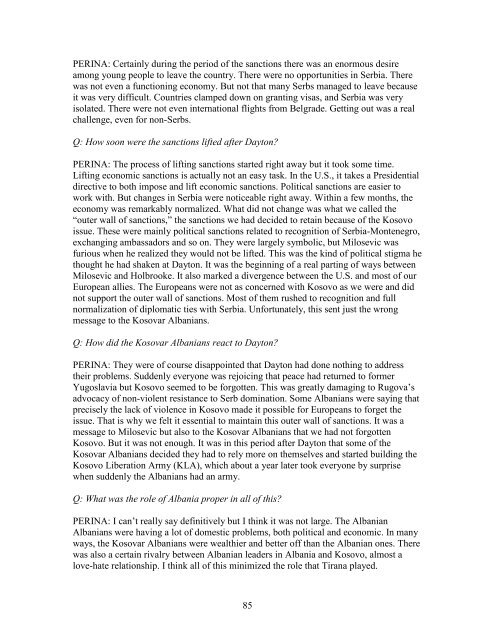ambassador rudolf v. perina - Association for Diplomatic Studies and ...
ambassador rudolf v. perina - Association for Diplomatic Studies and ...
ambassador rudolf v. perina - Association for Diplomatic Studies and ...
Create successful ePaper yourself
Turn your PDF publications into a flip-book with our unique Google optimized e-Paper software.
PERINA: Certainly during the period of the sanctions there was an enormous desire<br />
among young people to leave the country. There were no opportunities in Serbia. There<br />
was not even a functioning economy. But not that many Serbs managed to leave because<br />
it was very difficult. Countries clamped down on granting visas, <strong>and</strong> Serbia was very<br />
isolated. There were not even international flights from Belgrade. Getting out was a real<br />
challenge, even <strong>for</strong> non-Serbs.<br />
Q: How soon were the sanctions lifted after Dayton?<br />
PERINA: The process of lifting sanctions started right away but it took some time.<br />
Lifting economic sanctions is actually not an easy task. In the U.S., it takes a Presidential<br />
directive to both impose <strong>and</strong> lift economic sanctions. Political sanctions are easier to<br />
work with. But changes in Serbia were noticeable right away. Within a few months, the<br />
economy was remarkably normalized. What did not change was what we called the<br />
“outer wall of sanctions,” the sanctions we had decided to retain because of the Kosovo<br />
issue. These were mainly political sanctions related to recognition of Serbia-Montenegro,<br />
exchanging <strong>ambassador</strong>s <strong>and</strong> so on. They were largely symbolic, but Milosevic was<br />
furious when he realized they would not be lifted. This was the kind of political stigma he<br />
thought he had shaken at Dayton. It was the beginning of a real parting of ways between<br />
Milosevic <strong>and</strong> Holbrooke. It also marked a divergence between the U.S. <strong>and</strong> most of our<br />
European allies. The Europeans were not as concerned with Kosovo as we were <strong>and</strong> did<br />
not support the outer wall of sanctions. Most of them rushed to recognition <strong>and</strong> full<br />
normalization of diplomatic ties with Serbia. Un<strong>for</strong>tunately, this sent just the wrong<br />
message to the Kosovar Albanians.<br />
Q: How did the Kosovar Albanians react to Dayton?<br />
PERINA: They were of course disappointed that Dayton had done nothing to address<br />
their problems. Suddenly everyone was rejoicing that peace had returned to <strong>for</strong>mer<br />
Yugoslavia but Kosovo seemed to be <strong>for</strong>gotten. This was greatly damaging to Rugova’s<br />
advocacy of non-violent resistance to Serb domination. Some Albanians were saying that<br />
precisely the lack of violence in Kosovo made it possible <strong>for</strong> Europeans to <strong>for</strong>get the<br />
issue. That is why we felt it essential to maintain this outer wall of sanctions. It was a<br />
message to Milosevic but also to the Kosovar Albanians that we had not <strong>for</strong>gotten<br />
Kosovo. But it was not enough. It was in this period after Dayton that some of the<br />
Kosovar Albanians decided they had to rely more on themselves <strong>and</strong> started building the<br />
Kosovo Liberation Army (KLA), which about a year later took everyone by surprise<br />
when suddenly the Albanians had an army.<br />
Q: What was the role of Albania proper in all of this?<br />
PERINA: I can’t really say definitively but I think it was not large. The Albanian<br />
Albanians were having a lot of domestic problems, both political <strong>and</strong> economic. In many<br />
ways, the Kosovar Albanians were wealthier <strong>and</strong> better off than the Albanian ones. There<br />
was also a certain rivalry between Albanian leaders in Albania <strong>and</strong> Kosovo, almost a<br />
love-hate relationship. I think all of this minimized the role that Tirana played.<br />
85
















